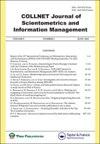Hegemony in global rankings: A Gramscian analysis of bibliometric indices and ranking results
IF 0.8
Q2 INFORMATION SCIENCE & LIBRARY SCIENCE
COLLNET Journal of Scientometrics and Information Management
Pub Date : 2022-07-03
DOI:10.1080/09737766.2022.2106165
引用次数: 0
Abstract
Research in academic university rankings mainly focuses on the methodological improvements in ranking or concern the practice, not the principle. There is a tendency in the core literature of rankings that they are ontologically accepted as reality-reflecting phenomena. However, this research tries a political analysis of ranking systems as hegemonic governing apparatus within the Gramscian Theory of Hegemony framework. For this purpose, we analyzed the top 100 lists of global university rankings and indices used in the rankings as research indicator sources. Even if this research is designed as political analysis, we integrated statistical findings to reveal the hegemonic oligarchs in rankings. The results show that there is a dominance of the USA and major Western European countries in ranking results and indices in terms of possession of journals. Moreover, correlation analysis gives evidence that different ranking system results reproduce a pre-given hierarchy. Drawing on Gramsci, the article resists the view of rankings as apolitical, subjective performance criteria of educational value, instead makes the rankings open to discussion in the realm of contestable politics as valuation and hierarchization tools of academic capitalist and neoliberalist forces to shape higher education globally within the frames of the best model, defined by global elites.全球排名中的霸权:文献计量指数和排名结果的葛兰西分析
学术大学排名的研究主要集中在排名方法的改进或关注实践,而不是原则。排名的核心文献中有一种趋势,即它们在本体论上被接受为反映现实的现象。然而,本研究试图在葛兰西霸权理论的框架内,对等级制度作为霸权统治机构进行政治分析。为此,我们分析了全球大学排名前100名的名单以及排名中使用的指数作为研究指标来源。即使这项研究被设计为政治分析,我们也整合了统计结果来揭示排名中的霸权寡头。结果表明,美国和西欧主要国家在期刊占有率排名结果和指数方面占据主导地位。此外,相关分析表明,不同的排名系统结果再现了预先给定的层次结构。这篇文章借鉴了葛兰西的观点,反对将排名视为非政治的、主观的教育价值表现标准,而是将排名作为学术资本主义和新自由主义力量的评估和分级工具,在全球精英定义的最佳模式框架内塑造全球高等教育,在可竞争的政治领域进行讨论。
本文章由计算机程序翻译,如有差异,请以英文原文为准。
求助全文
约1分钟内获得全文
求助全文
来源期刊

COLLNET Journal of Scientometrics and Information Management
INFORMATION SCIENCE & LIBRARY SCIENCE-
自引率
0.00%
发文量
11
 求助内容:
求助内容: 应助结果提醒方式:
应助结果提醒方式:


